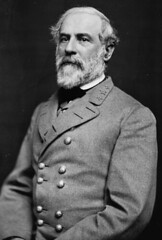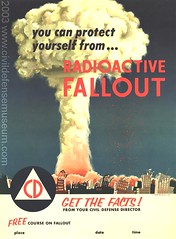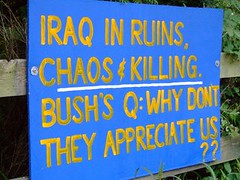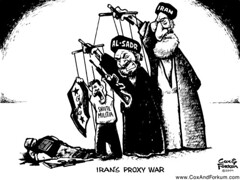The issue of the status and treatment of detainess has become heated. My opinion on this subject can not be charaterized as 'black and white'. If you're not going to read the whole thing, don't read it at all.
The section of the Geneva Conventions most often cited with respect to this issue is
Convention III, Part I, Articles 3 and 4. These were authored and agreed upon after WWII to improve and guarantee the treatment of members of the Armed Services of a nation, militia, volunteer corps, and civilans, in non-occupied territory, who spontaneously take up arms to resist and invader:
"without having had time to form themselves into regular armed units, provided they carry arms openly and respect the laws and customs of war."
History had shown the need to protect these categories of people from reprisals and cruel treatment in efforts to gain intelligence about military operations.
Using cruel treatment and torture to gather information (morality aside) is unwarranted as every person on the battlefield is aware of the risk they are exposed to. Every person on the battlefield has the ability to defend himself, to call on the support of his countrymen and allies, and can rest assured that, at his time of surrender, he will be treated humanely.
Other sections of the Geneva Conventions, which are less often cited include:
Combatants who deliberately violate the rules about maintaining a clear separation between combatant and noncombatant groups — and thus endanger the civilian population — are no longer protected by the Geneva Convention.
- Civilians are not to be subject to attack. This includes direct attacks on civilians and indiscriminate attacks against areas in which civilians are present.
- Civilians must not be used as hostages.
- Civilians must not be subject to outrages upon personal dignity.
- Civilians must not be subject to collective punishment and reprisals.
- Civilians must not receive differential treatment based on race, religion, nationality, or political allegiance.
And finally:
Although all combatants are required to comply with international laws, violations do not deprive the combatants of their status, or of their right to prisoner of war protections if they are captured.
So, we learn several things from these citations. First, if you violate the laws, you do not forfeit your right to be protected by them. Second, intentional attacks on unarmed civilians in occupied or non-occupied territory is forbidden. Third, if a combatant attempts to hide among civilians he looses his protection under the conventions.
How does this apply to the current situation?
The argument that our actions will influence the treatment of US soldiers or civilian captives/hostages has no legal basis. Is it based on reality? How have captured US Soldiers and civilians been treated since 2001?
Some Taliban fighters and certainly all terrorists gave up their protections under the Geneva Conventions long ago when they adopted the strategy of hiding among civilian populations.
Some Taliban may be, and certainly all terrorists are guilty of grave breaches of the Geneva Conventions and should be tried. Grave breaches include:
Any unlawful act which causes death or seriously endangers the health of a prisoner of war. (Convention III, Art. 13)
Unlawful transfer, deportation or confinement of civilians, willful killing, hostage taking and torture . (Protocol IV, Art. 147)
Attacking cultural objects when they’re not located near a military target or used for the war effort. (Protocol I, Art. 85, Sec. 4D)
Depriving civilians who are under the control of an enemy power of the right to a fair trial (Convention IV, Art. 147)
Depriving combatants, prisoners of war, refugees, or medical or religious personnel of a fair trial. (Protocol I, Art. 85, Sec. 4e)
Most importantly, the authors of the Geneva Conventions did not contemplate protecting non-uniformed
combatants who attack or seek to attack
civilains in occupied territory. The spirit of these laws was to protect civilians from war, and lawful combatants, capture in non-occupited territory, from abuse. I believe the current situation calls for a reinterpretation of various articles opposed to following them to the letter. Specifically, when the detainees are part of conspiracy or plot which poses
direct and imminent threat to civilians.
As distasteful as it feels, we should all put our right to live above the rights [arguably] afforded to the attackers under the Geneva Conventions.
Civilians are not alert to the risks posed by terrorists (they don't carry arms openly). Civilians can not defend themselves. We can not shoot back. We don't wear helmets, body armor, camoflage. We don't drive APCs to work. We've seen numerous videos of terrorists cutting the heads off journalists and other civilians. We have no guarantee of proper, humane treatment by our would-be captors.
In the unlikely, Hollyood-like case when unconventional interrogation techniques would be necessary (a near last-minute effort to prevent an attack) the government should be required to provide a full accounting of its evidence and its actions in a public court after the fact. If the case can't be made, officials at the highest levels should be tried.




